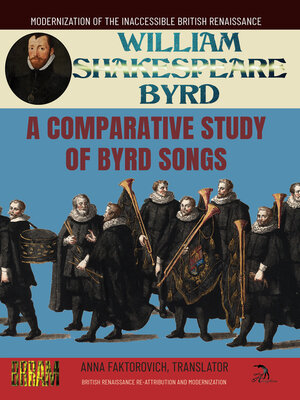A Comparative Study of Byrd Songs
ebook ∣ British Renaissance Re-Attribution and Modernization, Volume 17 · British Renaissance Re-Attribution and Modernization
By Anna Faktorovich

Sign up to save your library
With an OverDrive account, you can save your favorite libraries for at-a-glance information about availability. Find out more about OverDrive accounts.
Find this title in Libby, the library reading app by OverDrive.



Search for a digital library with this title
Title found at these libraries:
| Library Name | Distance |
|---|---|
| Loading... |
A comparative anthology of all of the variedly-bylined texts in William Byrd's linguistic-group, with scholarly introductions that solve previously impenetrable literary mysteries. This is a comparative anthology of William Byrd's multi-bylined verse, with scholarly introductions to their biographies, borrowings, and generic and structural formulas. The tested Byrd-group includes 30 texts with 29 different bylines. Each of these texts is covered in a separate chronologically-organized section. This anthology includes modernized translations of some of the greatest and the wittiest poetry of the Renaissance. Some of these poems are the most famous English poems ever written, while others have never been modernized before. These poems serve merely as a bridge upon which a very different history of early British poetry and music is reconstructed, through the alternative history of the single ghostwriter behind them. This history begins with two forgeries that are written in an antique Middle English style, while simultaneously imitating Virgil's Eclogues: "Alexander Barclay's" claimed translation of Pope Pius II's Eclogues (1514?) and "John Skelton's" Eclogues (1521?). The next attribution mystery solved is how only a single poem assigned to "Walter Rawely of the Middle Temple" (when Raleigh is not known to have been a member of this Inn of Court) in The Steal Glass: A Satire (1576) has snowballed into entire anthologies of poetry that continue to be assigned to "Raleigh" as their "author". Byrd's self-attributed Psalms, Sonnets, and Songs (1588) includes several lyrics that have since been re-assigned erroneously to other bylines in this collection, such as "My Mind to Me a Kingdom Is" being re-assigned to "Sir Edward Dyer". The Byrd chapter also describes the history of his music-licensing monopoly. An Oxford paper-degree helped "Thomas Morley" become basically the first non-priest Gospeller at the Chapel Royal. The section on "Morley's" Ballets (1595) describes the fiscal challenges Morley encountered when the music-monopoly temporarily transitioned from Byrd's direct control to his. "John Dowland's" First Book of Songs or Airs (1597) is explained as a tool that helped Dowland obtain an absurdly high 500 daler salary from King Christian IV of Denmark in 1600, and his subsequent equally absurd willingness to settle for a £21 salary in 1612 to become King James I's Lutenist. "William Shakespeare's" The Passionate Pilgrim (1599) has been dismissed by scholars as only containing a few firmly "Shakespearean" poems, in part because nearly all of its 20 poems had appeared under other bylines. Passionate's poems 16, 17, 19 and 20 are included, with an explanation of the divergent—"Ignoto", "Shakespeare" and "Marlowe"—bylines they were instead assigned to in England's Helicon (1600). Scholars have previously been at a loss as to identity of the "John Bennet" of the Madrigals (1599), and this mystery is solved with the explanation that this byline is referring to Sir John Bennet (1553-1627) whose £20,000 bail, was in part sponsored with a £1,200 donation from Sir William Byrd. The British Library describes Hand D in "Addition IIc" of Sir Thomas More as "Shakespeare's only surviving literary manuscript"; this section explains Byrd's authorship of verse fragments, such as "Addition III", and Percy's authorship of the overall majority of this censored play; the various handwritings and linguistic styles in the More manuscript are fully explained. "Thomas Ford's" Music of Sundry Kinds (1607) serves as a gateway to discuss a group of interrelated Jewish Court musicians, included Joseph Lupo (a potential, though impossible to test, ghostwriter behind the Byrd-group), and open...







